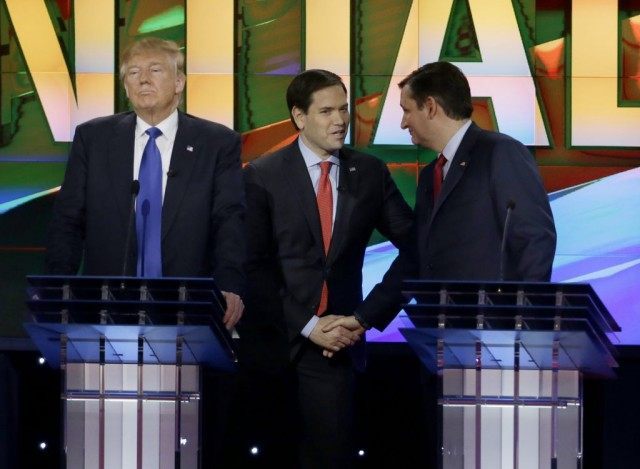The GOP debate in Houston on Thursday night was arguably Donald J. Trump’s worst of the entire 2016 campaign. He allowed Sen. Marco Rubio (R-FL) to mock him, and hurled insults while Sen. Ted Cruz (R-TX) took the high road. Rubio’s supporters are justifiably gleeful, and Cruz’s supporters were reassured to see him win on home turf.
Yes, Trump lost–but he also won. And not just because of online polls, or Chris Christie’s endorsement Friday.
Trump won because Rubio and Cruz each found a reason to stay in the race. So they will continue splitting the vote, allowing Trump to stay on top.
Trump mocks the idea that if his rivals combined their votes, they could defeat him. As other candidates drop out, he notes, at least some of those votes will come to him. Yet Trump consistently loses in head-to-head contests. If the Republican Party could consolidate behind Rubio or Cruz, Trump could still lose.
Whether because each sincerely believes he can win, or is too vain to yield to the other, Rubio and Cruz have failed to solve this puzzle. Cruz has suffered three third-place finishes in a row, but he has a good chance of winning two of the twelve Super Tuesday states (Texas and Arkansas), while Rubio leads in none. Conversely, while Cruz claims that he is the only candidate who can beat Trump, only Rubio has made him bleed. Rubio has also racked up a set of big endorsements. On the other hand, Cruz has much of the conservative media.
Neither feels an urgency to quit.
Nor do their supporters show any eagerness to reconcile. In fact, they may dislike each other more than they dislike Trump. Cruz supporters will never let Rubio forget the Gang of Eight, and Rubio fans consider Cruz unelectable.
If Rubio had done less well Thursday, or Cruz had collapsed, Trump would be in trouble. Instead, he won by losing.

COMMENTS
Please let us know if you're having issues with commenting.